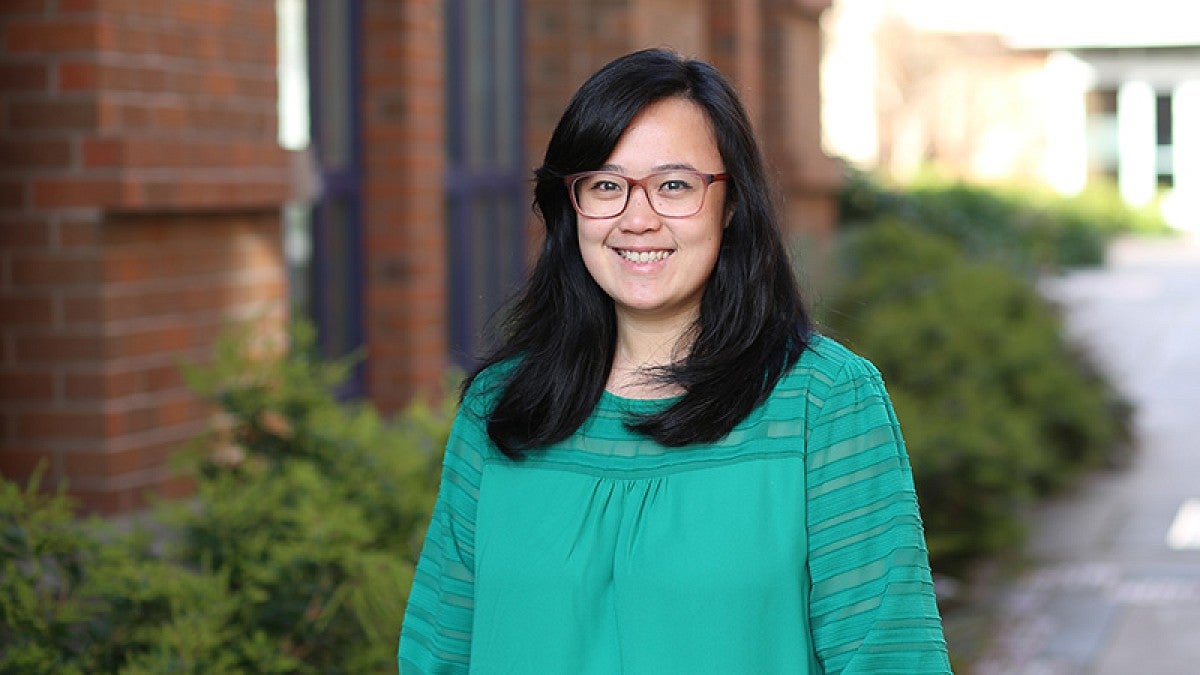Editor’s note: Duck of the Week is a new section in Around the O Workplace that highlights UO employees and their work. Each story features an interview with one employee, in his or her own words, with light editing for clarity and length only.
Update: Since our interview, Ruth has changed positions at the University of Oregon. She is now a Campus and Community Engagement (CaCE) program associate for the Division of Equity and Inclusion.
How long have you worked at the UO?
I have had two stints at the UO. After graduating from college, I moved out here in 2012 and worked in a short-term contract from August to April. I then went to grad school and recently came back at the end of last February. So, I’ve been here for a year.
Tell us about your work:
I was initially a study abroad advisor at Global Education Oregon (GEO). That’s what brought me back to the UO. But unfortunately, with the pandemic, we cancelled a bunch of programs and I was laid off from my position due to revenue losses. I came into this role as the Corona Corps supervisor afterward.
My day-to-day involves working with a great team of student employees. Right now, 100 percent of my team consists of undergraduate students. We run a call center and have trained student employees to run the phone lines. They call students who have either tested positive for COVID-19 or have been identified as close contacts of people who have tested positive.
In the Corona Corps, we’ve got two branches: the Care Team and the Contact Monitors. The Care Team works primarily with students who have tested positive, while Contact Monitors work primarily with close contacts to help answer questions, see if they have symptoms and support their day-to-day monitoring.
The Care Team is really where I spend my time. With case management, we call people who have tested positive and talk to them about when they need to be in isolation and how to safely do so. We connect them to resources they might need such as counseling services, grocery needs or a safe alternative housing location. We partner closely with University Housing and University Health Services to support on-campus students as well.
What does your typical day look like?
When Corona Corps started in June, its main priority was contact monitoring. As we saw the needs increasing over the summer, we thought about students coming back for the year in the fall and created the Care Team in response. The Care Team started in the middle of September, and I joined shortly after. We also work in partnership with Lane County Public Health, which who continues to support us in terms of funding and training.
The Care Team was brand new when it started, so a lot of the work revolved around learning, building systems and trying to figure out the best way to get ourselves in a place where we could support students and the community at large. We now have a whole crew of trained student employees and recently onboarded another group of new student employees. The students learn quickly and retain so much information. They adapt and are flexible because every single phone call is different. They have to ask good questions, to listen and figure out how to support each student. It’s nice to let the experienced student callers take the lead on things because they know what they’re doing and really make things possible. There’s no way myself or my co-supervisors could take on these calls and support hundreds of students alone.
What do you like about working at the UO?
I like how the University of Oregon is a big institution with lots of resources available to students, even though it can be tricky to navigate sometimes. For some students, coming to campus is the best thing for them because of their life circumstances. Not everyone is able to stay home or be in a different place if campus is shut down completely, so I’m glad that the university is providing opportunities for on-campus involvement.
I think the best part of working at the UO is the people that I work with. I’ve enjoyed that the most. My team is supportive, and we are all very dedicated to the work. Sometimes we have long days and long nights, but it's rewarding in the end.
What keeps you motivated?
I am inspired by people who are really committed to the work. We used to have a nine-hour weekly minimum for our student employees. Since going remote, however, things have changed and we decided to eliminate that requirement. Because the needs have increased, we have evening shifts now. We let students sign up for shifts on a regular basis and pick up shifts whenever they can. I think seeing how hard our students are working is motivating because some pick up four or five shifts per week—well beyond the old minimum. It’s impressive how students are fitting their work here into their very busy schedules. That’s what keeps me motivated, and it inspires me to keep coming back each day.
What is something people may not know about you?
I was originally born in Taiwan and that’s where I lived until I was six and a half. My family moved around a little bit, so I lived in Singapore for eight years and then in China for four years. I came to the US for college at the University of Illinois at Urbana-Champaign.
Ruth Huang was part of the Center for Global Health in the Division of Global Engagement. She now is a part of Campus and Community Engagement (CaCE) in the Division of Equity and Inclusion.
Do you know someone who should be Duck of the Week? Nominate a UO employee.


